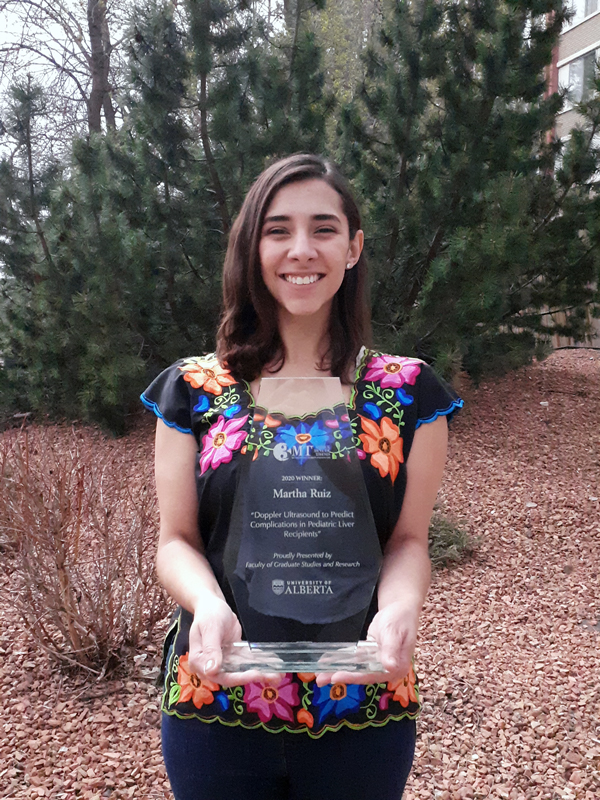
We are pleased to share that since publication of this original article, recent Master's graduate Martha Ruiz was named runner-up at the Western Canadian Regional 3MT competition, hosted online by the University of Alberta on September 23. Her presentation, "Doppler Ultrasound to Predict Complications in Pediatric Liver Recipients," drew upon her research in the field of radiology and diagnostic imaging.
It's no easy feat to unpack the technical elements of pediatric liver transplants for a general audience, but Martha Ruiz succeeded to win the 2020 Three Minute Thesis (3MT) competition at the University of Alberta. Since 2015, UAlberta graduate students have competed in the annual university-wide competition to explain the significance of their research projects to an audience in three minutes or less. UAlberta 3MT winners receive a cash prize and a trip to Western Canadian Regional Finals, where they compete with the winners of other 3MT university competitions.
"All of our finalists did a wonderful job, but Martha was particularly effective at making her topic immediately accessible and explaining the larger impact of her work," says Charity Slobod, who coaches 3MT participants in her role as Community Connect Lead for the Faculty of Graduate Studies and Research.
Ruiz recently completed a master's degree in the Department of Radiology and Diagnostic Imaging, having previously earned a medical degree in her native Mexico. As a medical resident, she encountered significant gaps in research when treating liver transplant patients. "I thought that if I studied hard enough in medical school, I wouldn't face major diagnostic dilemmas or find myself at loss to analyze data," she reflects. "I was wrong."
According to Ruiz, liver transplant recipients routinely undergo Doppler ultrasounds after surgery. She vividly recalls the case of one teenage girl whose ultrasound data puzzled her medical team. "Essentially, we had collected data about the velocity of the blood flow inside the vessels that connected the liver transplant to the rest of her body," explains Ruiz, "but we scoured the literature and found no established parameters for what that velocity should be." Her colleagues decided not to intervene, and the girl's complications became so severe that she had to receive a second transplant. "I realized then and there that this was an area of research I had to pursue," says Ruiz.
For her master's thesis, Ruiz conducted an extensive review of post-operative ultrasound data in an effort to identify something that could predict future complications in transplant recipients. After months of painstaking research, she struck her target: the velocity of one vessel called the portal vein. "I described the vessel like a straw in my 3MT presentation," she shares. "If the straw is twisted or bent, it's hard to drink a smoothie through it. It's the same with vessels and blood flow."
Ruiz successfully linked a portal vein velocity of less than 60 centimeters per second to a five to six times higher risk of developing a complication within 30 days of surgery. Physicians can use her discovery to avoid more costly, invasive diagnostic tools and improve the prognosis of their patients. "If this research saves one child or prevents one complication from occurring, it will be enough," she affirms.
Martha earned her graduate degree with the support of a scholarship awarded by the National Council of Science and Technology (CONACyT), an organization that enables Mexican students to pursue research-based graduate programs at highly-ranked partner institutions abroad. "As an international student with an accent, I was apprehensive about entering the 3MT competition," Ruiz admits, "but delivering the presentation boosted my confidence and reminded me of my purpose." She will soon begin a fellowship position in pediatric radiology at Stollery Children's Hospital, where she will continue to research predictors of liver transplant complications. "Ultimately, my dream is to split my time between Canada and Mexico, conducting multi-centric studies in both countries," shares Ruiz. "There is so much more to learn and explore."